In times of rapid growth, we look to the future with excitement while also assuring that our expansion is sustainable. The Promega Global Facilities Planning Team emphasizes environmental stewardship and long-term planning. Each building is designed to meet ambitious sustainability goals, and innovations incorporated into each project inform the next. In 2019, we finished construction on two new buildings in Europe and made progress on two important facilities at our headquarters in Wisconsin.
Continue reading “New Year, New Buildings, Same Commitment to Sustainability”Corporate Responsibility and Sustainability
Sustainability Makeover: Parking Ramp Edition

As Promega grows globally and locally here at headquarters, the construction of new and expanding facilities are considered with great care to ensure a commitment to sustainability. Between April and November of 2019, the parking ramp located near the Feynman Center received a massive upgrade with long-term impacts on the company’s sustainability goals.
Continue reading “Sustainability Makeover: Parking Ramp Edition”Stakeholder Capitalism—40 Years Later
Today’s blog is written by guest blogger, Penny Patterson, VP Corporate Communications at Promega.
The idea that businesses need to serve and provide value to constituents in addition to shareholders is one that has gained increasing recognition since last summer when the Business Roundtable issued its “Statement on the Purpose of the Corporation.” The topic of what some call “stakeholder capitalism” surfaced again heading into the World Economic Forum in January 2020.
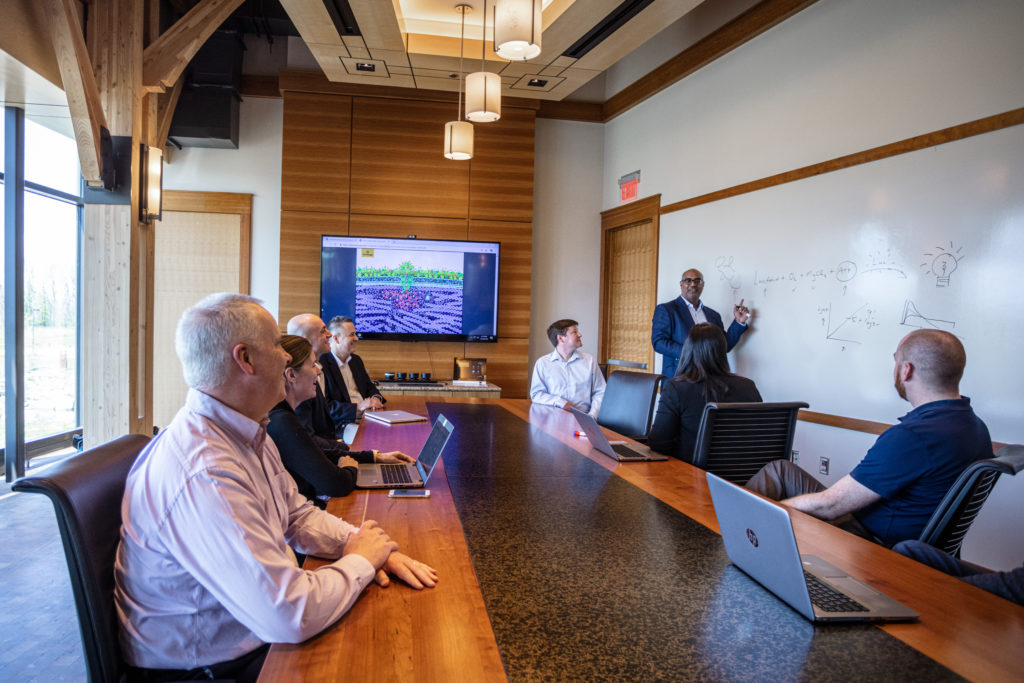
Promega has practiced “stakeholder capitalism” for more than 40 years and, as we’ve shared through our corporate responsibility reporting for the last decade, we have seen meaningful impact. From our founding in 1978, we have taken a “whole human” approach to our business. For us this means growing a financially stable and profitable company that considers and benefits science, employees, customers, community, shareholders and all global residents.
This approach starts with our people. We live the notion that every one of our employees has the potential to make a meaningful difference. And they do. Here are just a few examples. Our manufacturing and operations teams deliver with 99% accuracy and a complaint rate of 0.004%. Discoveries by our R&D scientists generate some of the most read papers among key science journals. The average tenure of our leadership team is 18 years, and over half of these leaders grew their careers and capabilities at Promega.
Continue reading “Stakeholder Capitalism—40 Years Later”Green Chemistry is Better Chemistry
When you think of sustainability, what comes to mind? Immediately, my brain imagines vast collections of plastic in the ocean and carbon emissions from millions of cars. I’m guessing that, like me, you didn’t think about optimizing the synthesis of chemical reactions to reduce toxicity or energy usage. Although we’re often focused on the more visible forms of waste, sustainability applies to an enormous range of human activities.
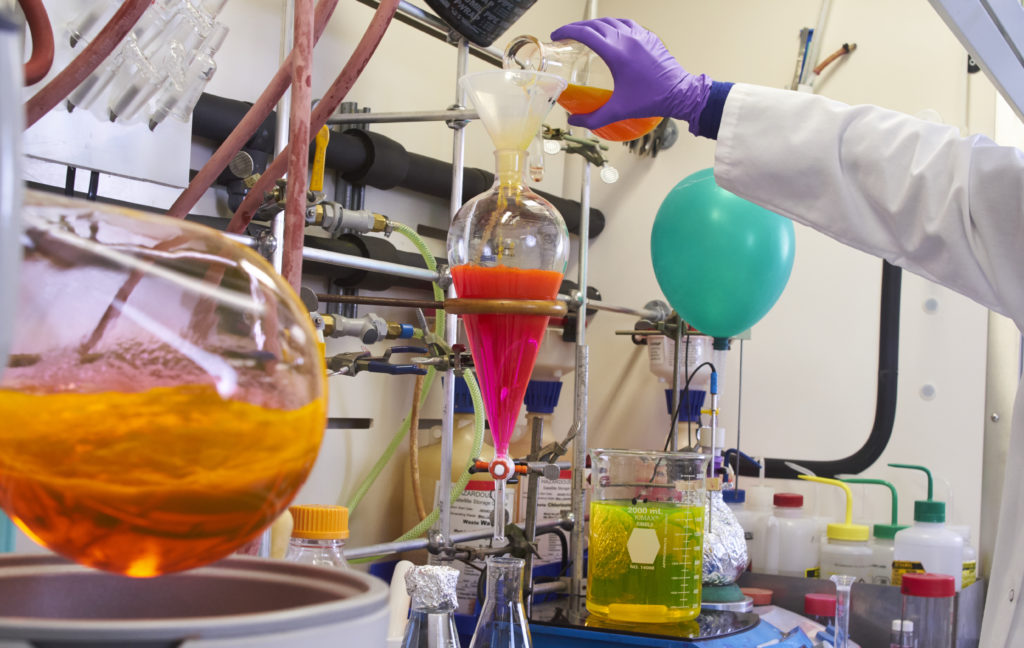
Promega is committed to integrating the principles of sustainability across all aspects of our business. One recent area of focus for our PBI branch is a shift toward Green Chemistry. PBI synthesizes reagents and small molecules used in Promega products. After deciding “it was the right thing to do for our customers and for the environment,” the leader of Promega’s Corporate Responsibility Program, Corey Meek, assembled a few individuals to start a conversation about implementing Green Chemistry principles.
Continue reading “Green Chemistry is Better Chemistry”“It was the right thing to do for our customers and for the environment.”
Working in the Lab to Save Animals in the Wild
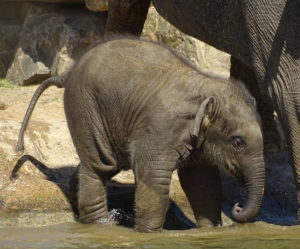
Wildlife conservation is a major focus around the world. With habitat loss and climate change, Asian elephant populations are under severe pressure. Add in an infectious disease that is fatal to the young and you have a recipe for disaster. Even with efforts to breed the endangered Asian elephants in zoos to build the population, elephant endotheliotropic herpesvirus (EEHV) thwarts conservation efforts. EEHV causes hemorrhagic disease in Asian elephants younger than 10 years old, a disease with rapid onset and high mortality. In fact, some numbers indicate EEHV is the cause of death for at least 25% of Asian elephants born in zoos and the wild globally.
Continue reading “Working in the Lab to Save Animals in the Wild”Promega Scientists Helping Researchers and Students at the Marine Biological Laboratory
This summer, I had the opportunity to go to the Marine Biological Laboratory (MBL) in Woods Hole, Massachusetts. MBL was founded in 1888 as an institution that focuses on research and education. Woods Hole is located on Cape Cod and has rich biodiversity that is the focus of the resident researchers and the many others that travel there each summer. It was here that new model organisms were discovered, allowing significant advancement in various fields. For example, squid have large axons that allowed researchers to expand our knowledge of neurons.
Over 500 scientists from over 300 institutions in over 30 countries come to MBL each year as trainees1. There are 19 advanced research training courses for pre-and post-doctoral scientists in development, reproduction, cell physiology, microbiology, infectious disease, neuroscience, and microscopy. Faculty that teach the courses are leaders in their respective fields. In addition, MBL has a neuro-physiology fellowship program through the Grass Foundation that allows early-stage researchers to come to MBL for 14 weeks to do research.
Continue reading “Promega Scientists Helping Researchers and Students at the Marine Biological Laboratory”Celebrating and Supporting Women in STEM for Science-a-thon
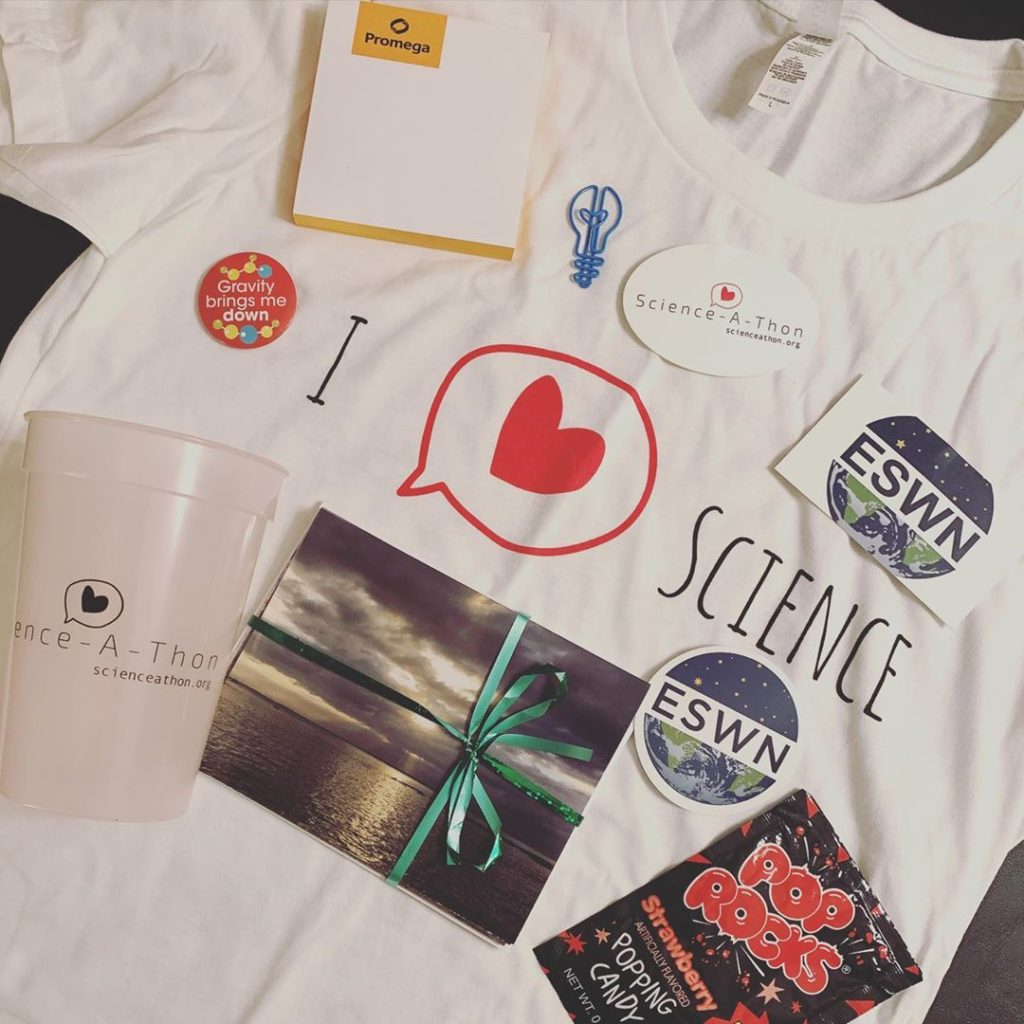
During the week of October 14-18, scientists and science communicators around the world came together for a social media celebration of science, technology, engineering, and math (STEM). Science-a-thon has its roots in Madison, WI, where Tracey Holloway (a professor at UW-Madison) had the idea to raise money to support organizations that advance the careers of women in STEM fields.
This year, Science-a-thon participants collectively raised over $14,500 for three partner charities: the Earth Science Women’s Network, Girls Who Code, and the Society of Women Engineers.
We at Promega were proud to be an active supporter of the event through sponsorship and participation. This year, we had 5 employees share their #dayofscience through daily Instagram story takeovers, as well as their personal social media accounts to give followers a glimpse of #lifeatpromega.
Continue reading “Celebrating and Supporting Women in STEM for Science-a-thon”Kyle Hill Explains the Science of Star Wars at the Wisconsin Science Festival
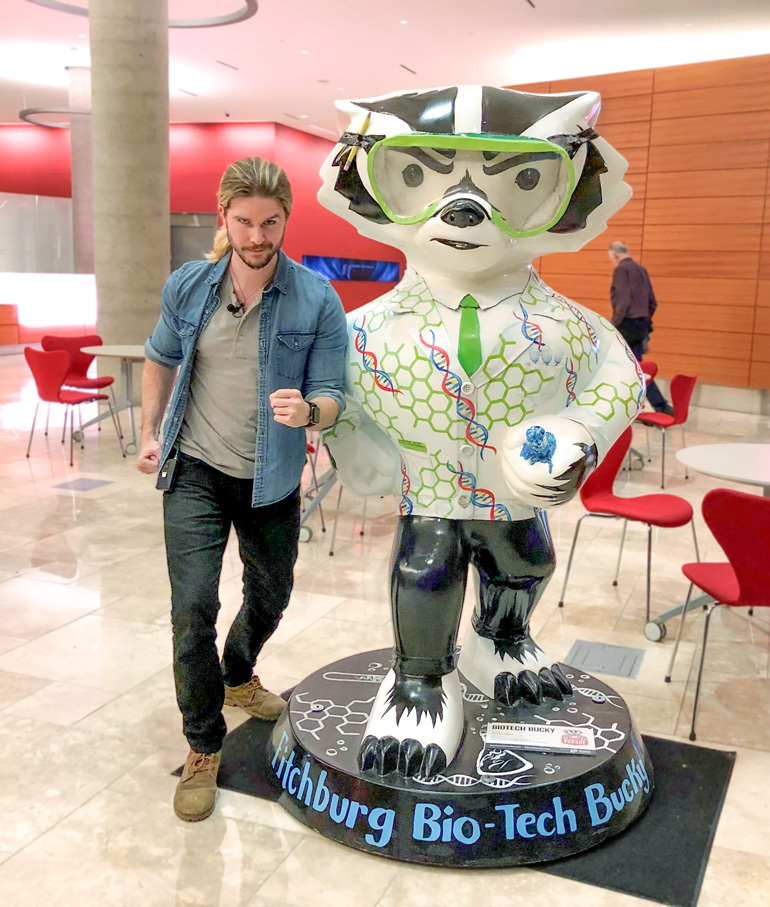
With another major Star Wars film about to hit the theaters this year, sci-fi enthusiasts are abuzz with excitement to watch epic lightsaber battles and hyperspace travel. But are these sci-fi concepts more grounded in science or fiction? That is what science communicator Kyle Hill aims to explore.
A Wisconsin native, Hill graduated from Marquette University with degrees in engineering and science communication. Now he resides in Los Angeles, where he built a career writing and talking about the intersection of science and pop culture through his video series, Because Science.
This past weekend at the Wisconsin Science Festival, hundreds of fans gathered to hear Hill share his ideas on how the sci-fi concepts in the Star Wars movies aren’t that far off from actual science.
Continue reading “Kyle Hill Explains the Science of Star Wars at the Wisconsin Science Festival”WiSciFest 2019: A Retrospective
This past weekend was the 9th Annual Wisconsin Science Festival, and we at Promega were excited to join in the celebration of science throughout the state. We participated in the Discovery Expo on Thursday and Friday, where dozens of demonstrations and exhibits were scattered throughout the Wisconsin Institute for Discovery building. Thousands of children on field trips filled the halls, eager to poke and prod at strange and exciting new things.
At our table, we talked about the science of bioluminescence. With 3D-printed firefly luciferase models in hand, we showed the glow of recombinant luciferase to the incoming children and explained to them how scientists could use bioluminescence like a tiny “flashlight” to look inside of cells and watch what’s happening. Our learners received a nice little reward for their attentiveness in the form of glow-in-the-dark firefly stickers.
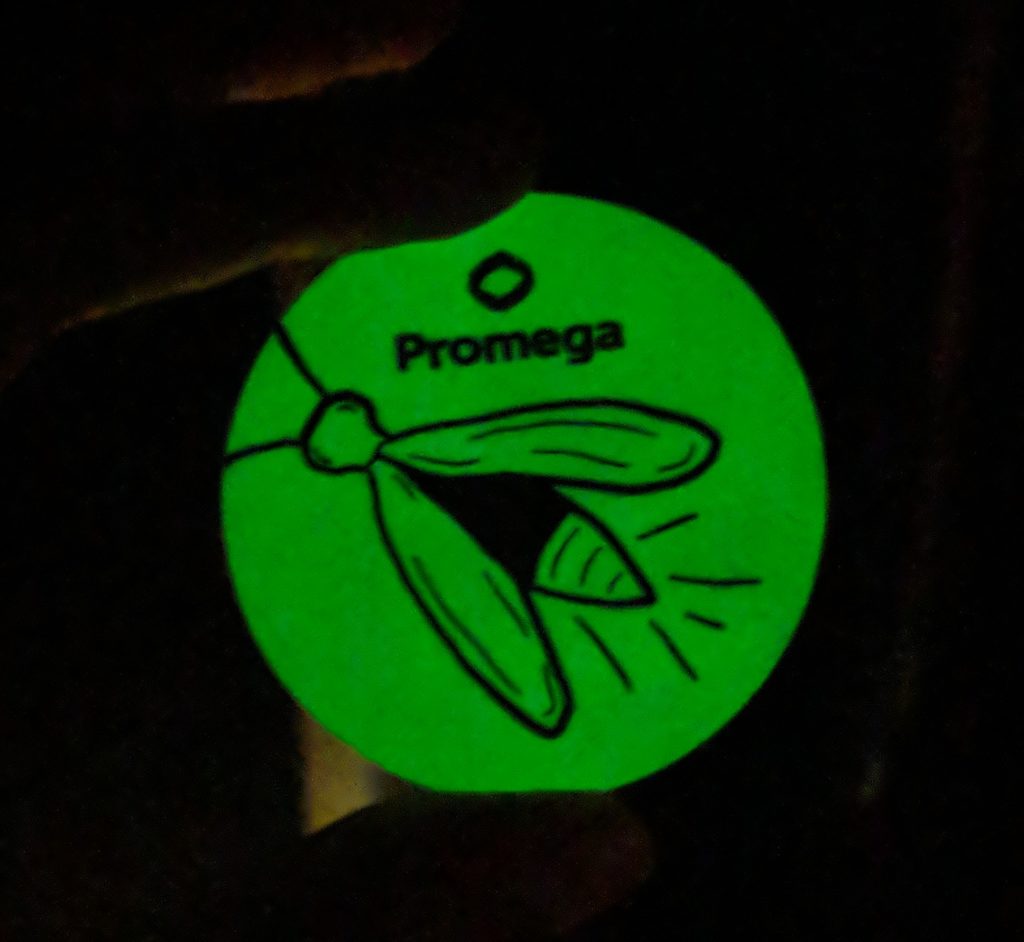
Promega Receives Wisconsin 75 Sustainability Award
There is nothing like a bit of recognition to energize your efforts, right? Promega was recently awarded the 2019 Distinguished Performer: Sustainability award, as one of the Deloitte Wisconsin 75 awardees.
This award is not so much a feather in our cap, as fuel for our sustainability fire both in Madison, and globally. Here are a few details on the award and why Promega was chosen.
The Deloitte Wisconsin 75 awards recognize private sector companies that:
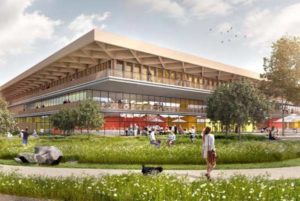
- Are headquartered in Wisconsin
- Have a majority (>50%) of ownership held by an individual, family or employees stockholders
- Have at least $50M in annual sales
